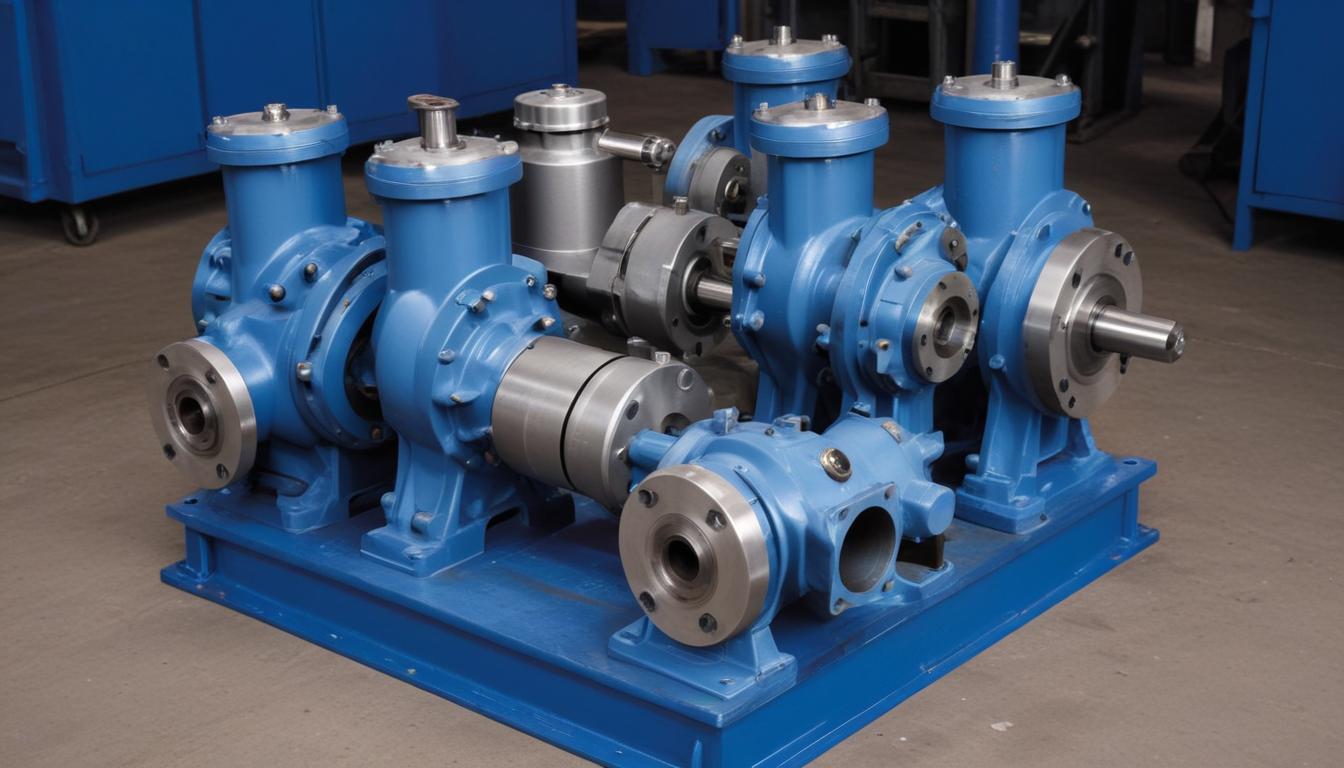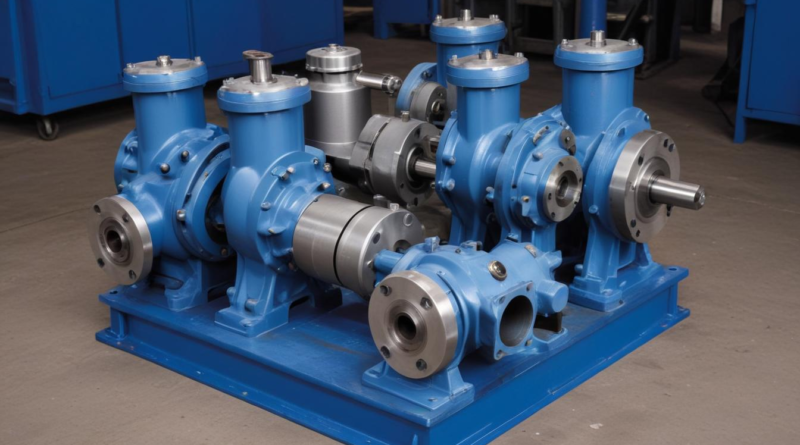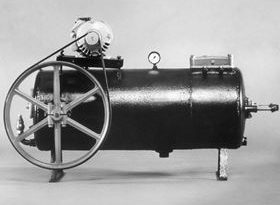the benefits of using piston pumps
Piston pumps excel in delivering efficient fluid handling, making them indispensable in numerous industrial and commercial applications. Their inherent design and operational characteristics provide several benefits that enhance fluid management processes:
- Positive Displacement Mechanism: Ensures a consistent and precise flow rate by displacing a fixed volume of fluid with each piston movement.
- High Volumetric Efficiency: Minimizes fluid slip and leakage, maximizing the amount of fluid transferred per cycle.
- Adjustable Flow Rates: Allows for fine-tuning based on specific application requirements, enhancing versatility and control.
- Wide Range of Fluid Compatibility: Capable of handling various fluid viscosities, from low to high, without compromising performance.
Features that contribute to their efficient fluid handling include:
| Feature | Description |
|---|---|
| Precision Control | Accurate regulation of fluid flow and pressure, ensuring reliability in sensitive applications. |
| Robust Construction | Durable materials and engineering extend the pump’s operational lifespan, reducing downtime. |
| Energy Efficiency | Optimized performance reduces energy consumption, lowering operational costs. |
The combination of these features ensures that piston pumps can handle fluids efficiently, even in demanding environments. Their ability to maintain steady flow rates and adapt to varying fluid characteristics makes them a reliable choice for applications such as hydraulic systems, chemical processing, and water treatment. By providing consistent and controlled fluid movement, piston pumps enhance overall system performance and contribute to operational excellence.
high pressure capabilities
Piston pumps are renowned for their ability to generate and maintain high pressures, making them ideal for applications that demand robust performance. This capability stems from their positive displacement mechanism, which allows for the consistent buildup of pressure within the system. The significant pressure output of piston pumps offers several advantages:
- Enhanced Performance: High pressure ensures efficient operation in demanding environments, such as hydraulic systems and heavy machinery.
- Versatility: Capable of handling a wide range of applications, from industrial processes to high-pressure cleaning and automotive systems.
- Precision Control: Enables accurate regulation of pressure levels, which is crucial for processes requiring meticulous control.
- Energy Efficiency: High pressure output can reduce the need for multiple pumps, optimizing energy consumption and operational costs.
Key features that enable piston pumps to achieve high pressure include:
| Feature | Description |
|---|---|
| Robust Construction | Utilizes high-strength materials such as hardened steel to withstand extreme pressures and reduce the risk of mechanical failure. |
| Advanced Sealing Mechanisms | Employs precision-engineered seals to prevent leaks and maintain pressure integrity within the system. |
| Efficient Cooling Systems | Incorporates cooling features to dissipate heat generated during high-pressure operations, ensuring consistent performance. |
| Adjustable Stroke Length | Allows for modification of the piston’s movement, enabling control over the pressure output based on application needs. |
The ability to generate high pressure is further enhanced by the design and engineering of piston pumps, which prioritize durability and reliability. Features such as adjustable stroke lengths and efficient cooling systems ensure that the pumps can sustain high-pressure operations over extended periods without compromising performance. Additionally, the precision control offered by piston pumps allows for fine-tuning of pressure levels, making them suitable for applications that require exact pressure specifications.
Applications that benefit from the high pressure capabilities of piston pumps include:
- Hydraulic Systems: Powering machinery and equipment in industries such as construction, manufacturing, and automotive.
- Oil and Gas: Facilitating the extraction and transportation of oil and gas through pipelines and other high-pressure systems.
- High-Pressure Cleaning: Providing the necessary force for industrial cleaning processes, removing stubborn contaminants from surfaces.
- Chemical Processing: Ensuring efficient mixing and reaction processes that require precise pressure control.
By delivering high pressure consistently and reliably, piston pumps offer significant benefits in enhancing the efficiency and effectiveness of various industrial and commercial applications. Their ability to maintain high pressure under demanding conditions underscores their importance in sectors where performance and reliability are paramount.
durability and longevity
Durability and longevity are paramount factors that contribute to the sustained performance and reliability of piston pumps in various applications. The robust construction and high-quality materials used in manufacturing these pumps ensure they can withstand the rigors of demanding environments, providing long-term operational excellence.
Key elements that enhance the durability of piston pumps include:
- High-Quality Materials: Utilizing materials such as hardened steel, stainless steel, and corrosion-resistant alloys extends the pump’s lifespan and maintains performance under harsh conditions.
- Precision Engineering: Advanced manufacturing techniques ensure tight tolerances and superior fitment of components, reducing wear and tear during operation.
- Advanced Sealing Technology: Effective seals prevent leaks and protect internal components from contamination, enhancing the overall durability of the pump.
- Thermal Stability: Resistance to temperature fluctuations and effective heat dissipation mechanisms allow piston pumps to operate efficiently without degradation over time.
- Vibration and Shock Resistance: Design features that mitigate the effects of vibration and shock extend the pump’s operational life, particularly in mobile and dynamic applications.
Benefits of the durability and longevity of piston pumps include:
- Reduced Downtime: Longer-lasting components mean fewer interruptions for maintenance and repairs, ensuring continuous operation.
- Cost Efficiency: Extended service intervals and decreased need for replacements lower the total cost of ownership.
- Consistent Performance: Durable pumps maintain their performance levels over time, ensuring reliable fluid handling and pressure capabilities.
- Environmental Resistance: Enhanced durability allows piston pumps to perform effectively in extreme environments, including corrosive and high-temperature settings.
Features that contribute to the durability and longevity of piston pumps are illustrated in the table below:
| Feature | Description |
|---|---|
| Hardened Components | Use of hardened materials for pistons and cylinders to resist wear and abrasion. |
| Corrosion-Resistant Finishes | Protective coatings that prevent rust and corrosion in aggressive environments. |
| Enhanced Sealing Systems | Advanced seals that maintain integrity under high pressure and temperature conditions. |
| Modular Design | Ease of replacing individual components without needing to replace the entire pump. |
| Vibration Dampening | Integrated features that reduce the impact of vibration, minimizing component fatigue. |
The combination of these features ensures that piston pumps not only deliver exceptional performance but also offer prolonged service life. This reliability is crucial for industries that depend on uninterrupted operations, such as manufacturing, oil and gas, and chemical processing. By investing in piston pumps with proven durability and longevity, businesses can achieve greater operational stability, reduce maintenance costs, and enhance overall productivity.
versatility in applications
 Piston pumps demonstrate remarkable adaptability across a wide spectrum of industries and applications, underscoring their versatility. This flexibility is achieved through their customizable design and the ability to handle various fluids and operational conditions. The ability to tailor piston pump configurations to specific needs makes them suitable for diverse environments, from industrial manufacturing to specialized laboratory settings.
Piston pumps demonstrate remarkable adaptability across a wide spectrum of industries and applications, underscoring their versatility. This flexibility is achieved through their customizable design and the ability to handle various fluids and operational conditions. The ability to tailor piston pump configurations to specific needs makes them suitable for diverse environments, from industrial manufacturing to specialized laboratory settings.
- Industrial Manufacturing: Piston pumps are integral in processes such as injection molding, metal forming, and assembly lines, where precise fluid control is essential.
- Automotive Sector: Utilized in hydraulic systems for braking, steering, and suspension, piston pumps ensure smooth and reliable vehicle operations.
- Chemical Processing: Their ability to handle corrosive and reactive chemicals makes piston pumps ideal for mixing, dosing, and transferring chemicals in production facilities.
- Water Treatment: Employed in the circulation and filtration systems, piston pumps aid in maintaining water quality and managing flow rates efficiently.
- Oil and Gas: Critical in drilling operations, piston pumps facilitate the extraction and transportation of hydrocarbons by maintaining high-pressure fluid flow.
- Pharmaceuticals: Ensuring sterility and precision, piston pumps are used in the formulation and packaging stages where exact fluid measurements are crucial.
- Food and Beverage: Their ability to handle food-grade fluids without contamination makes piston pumps suitable for processing, bottling, and packaging applications.
- Renewable Energy: In solar thermal systems and geothermal applications, piston pumps manage the transfer of heat-transfer fluids efficiently.
The table below highlights key applications of piston pumps along with the specific features and benefits that make them ideal for each use case:
| Application | Key Features | Benefits |
|---|---|---|
| Industrial Manufacturing | High flow rates, precision control | Enhances production efficiency, ensures consistent product quality |
| Automotive Systems | Durable construction, high pressure capabilities | Ensures reliable vehicle performance, reduces maintenance needs |
| Chemical Processing | Corrosion-resistant materials, precise dosing | Prevents contamination, improves process accuracy |
| Water Treatment | Energy-efficient operation, adjustable flow rates | Reduces operational costs, adapts to varying water demands |
| Oil and Gas | High pressure output, robust seals | Facilitates efficient extraction, minimizes leaks and downtime |
| Pharmaceuticals | Sterile design, precise control | Maintains product purity, ensures accurate formulations |
| Food and Beverage | Food-grade materials, easy cleaning | Prevents contamination, simplifies maintenance processes |
| Renewable Energy | Efficient thermal fluid handling, reliability | Optimizes energy transfer, ensures consistent system performance |
Additionally, the modular design of piston pumps allows for easy integration into existing systems and the ability to scale operations as needed. This adaptability is further enhanced by the availability of various configurations, such as single-acting or double-acting pumps, which can be selected based on the specific requirements of the application. The combination of these features ensures that piston pumps can meet the unique demands of each sector, providing reliable performance and delivering significant benefits in terms of efficiency, cost-effectiveness, and operational flexibility.
Moreover, piston pumps are capable of handling a broad range of fluid viscosities and temperatures, which is crucial for applications that involve varying process conditions. Their ability to maintain performance under different environmental factors makes them a preferred choice for industries that require consistent and dependable fluid management solutions. By offering such extensive versatility, piston pumps play a vital role in optimizing operations, enhancing productivity, and supporting the dynamic needs of modern industrial applications.
low maintenance requirements
Piston pumps are designed to minimize the need for frequent maintenance, which is a significant advantage for industries aiming to reduce downtime and operational costs. The inherent simplicity and robust construction of these pumps contribute to their low maintenance requirements, ensuring consistent performance over extended periods.
Key aspects that facilitate low maintenance include:
- Simplified Design: The straightforward architecture of piston pumps reduces the number of moving parts, decreasing the likelihood of mechanical failures and simplifying maintenance procedures.
- Easy Access to Components: Thoughtful design allows for effortless access to critical components, enabling quick inspections, repairs, and replacements without extensive disassembly.
- High-Quality Seals and Bearings: Durable seals and bearings minimize wear and tear, reducing the frequency of replacements and maintenance interventions.
- Self-Adjusting Mechanisms: Features such as automatic lubrication systems ensure that moving parts receive consistent lubrication, preventing premature wear and extending the pump’s lifespan.
- Modular Construction: The ability to replace individual modules or parts without needing to replace the entire pump enhances maintainability and reduces overall maintenance efforts.
Benefits of low maintenance requirements include:
- Reduced Downtime: Minimal maintenance needs ensure that piston pumps remain operational for longer periods, enhancing productivity and minimizing interruptions.
- Lower Operational Costs: Fewer maintenance activities translate to decreased labor and material expenses, contributing to overall cost savings.
- Extended Equipment Lifespan: Consistent and simplified maintenance practices help in preserving the integrity and functionality of the pump over time.
- Improved Reliability: Regular, easy maintenance fosters a proactive approach to pump care, resulting in more reliable and predictable performance.
The table below outlines the features that contribute to the low maintenance profile of piston pumps:
| Feature | Description |
|---|---|
| Simplified Design | Minimal moving parts reduce the complexity and potential points of failure. |
| Accessible Components | Ease of access to critical parts facilitates quick maintenance and repairs. |
| Durable Seals and Bearings | High-quality materials extend the life of seals and bearings, decreasing replacement frequency. |
| Automatic Lubrication | Ensures consistent lubrication of moving parts, preventing excessive wear. |
| Modular Design | Allows for individual components to be replaced or upgraded without replacing the entire pump. |
Moreover, the proactive maintenance approach enabled by these features ensures that piston pumps remain in optimal working condition. Regular inspections and minor adjustments can be performed with ease, preventing potential issues from escalating into major problems. The reliability and ease of maintenance associated with piston pumps make them a preferred choice for industries where consistent operation and minimal maintenance interruptions are critical.
In addition to the mechanical benefits, the low maintenance requirements of piston pumps also contribute to environmental sustainability. Reduced need for frequent part replacements and less downtime for repairs lead to lower waste generation and more efficient use of resources. This eco-friendly aspect aligns with the growing emphasis on sustainability in industrial operations.
By prioritizing low maintenance, piston pumps not only offer operational and financial advantages but also support the broader goals of efficiency and sustainability. These attributes make piston pumps a strategic investment for businesses seeking reliable, cost-effective, and environmentally responsible fluid handling solutions.





Pingback: How to Identify Types of Piston Pump in Hydraulic Systems? - ANTITECK